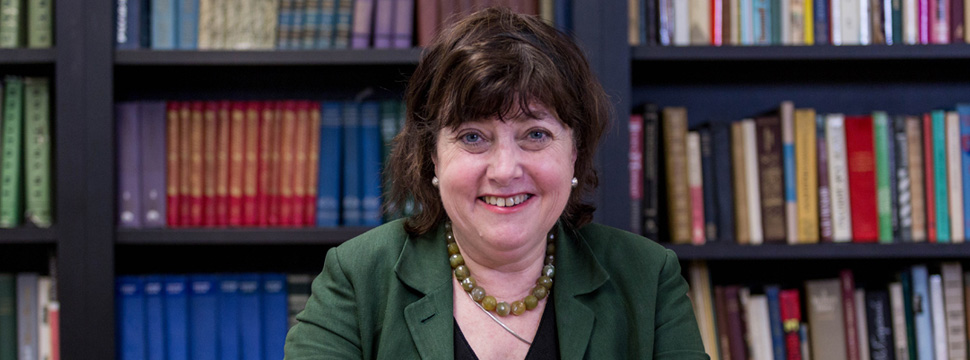-Part of a special feature on literary translation
Widely regarded as the best English translator of Polish poetry, Clare Cavanagh often loses track of the number of volumes she’s translated. Her output — and the honors, awards and acclaim — are not her priority. Cavanagh, who chairs Northwestern’s Department of Slavic Languages and Literatures, is openly uninterested in the theory of translation and knows more about Nobel Prize politics than she’d like. For her, the joy of poetic translation lies in its intimacy.
“I try to get a poem to a place where you can shake it and nothing rattles. Everything is in its place,” says Cavanagh, who estimates she has published 17 translations to date (that number refers only to books; more than 60 of her translations have been published in The New Yorker, The New Republic and The New York Review of Books), including works by Nobel laureate Wisława Szymborska.
Cavanagh began translating in graduate school at Harvard University. Her professor, Stanislaw Baranczak, asked for help translating from Polish to English because Cavanagh’s English was superior to his. Almost immediately, Cavanagh was hooked. “We started and we couldn’t stop,” she says. Northwestern University is a live wire as far as literature and poetry in translation go.”
Before Cavanagh was fluent in Polish, she and Baranczak published an anthology of Polish poetry from the last decades of communist rule. In 1985, the two started translating famed Polish poet Wisława Szymborska, and one of those volumes received the PEN Translation Prize.
Szymborska was awarded the Nobel Prize in Literature in 1996. Cavanagh flew to Sweden to attend the ceremony and celebration. “My Polish wasn’t perfect, and I was scared out of my mind” to meet Szymborska, Cavanagh says, fondly recalling Szymborska’s graciousness when she confused the Polish word for “young son” with “little ham.”
Cavanagh became great friends with Szymborska, who died in 2012 and whose final works Cavanagh translated to great praise. In a New York Times book review of her final Szymborska translation, fellow translator Richard Lourie said that if a Nobel Prize for translators existed, Cavanagh would surely have earned it.
For more than 20 years, Cavanagh has also been working with Polish poet Adam Zagajewski, whom she also considers a dear friend. She smiles as she describes Zagajewski’s tendency to call her requesting a translation at a moment’s notice.
“I say ‘Adam it’s like you’re a teenage girl asking her mother to sew her a new prom dress in three days.’ I can’t always do a translation that fast.”
Cavanagh’s most recent translation of Zagajewski’s work was published in April by Farrar, Straus and Giroux.
In addition to the lifelong friends Cavanagh has made from translation, she’s also gained a deeper understanding of poetic work.
“With translation, you see poems in a way you never would have otherwise,” she says. “You see how poets work, what fed into the poem. Now I can’t ever subtract the human element.”
That human element extends to the impact of poetic translation as well. Cavanagh has received emails from veterinarians for whom Szymborska’s poems about animals were their first foray into poetry. A hydro-physicist and professor at Caltech once contacted Cavanagh to say Szymborska “really gets water” and that he begins his lectures with her poems.
“Getting things translated has served as a conduit to the world,” Cavanagh says, citing translations of Homer, the Hebrew Bible and popular hymns. “Translation is a critical bridge,” not just across countries and cultures, but also between different genres and forms of media.
“We all live on those translations,” she says. “They feed everything we do."
Clare Cavanagh is the Frances Hooper Chair in the Arts and Humanities and chair of the Slavic Languages and Literatures Department in the Weinberg College of Arts and Sciences. She is a professor of Slavic literatures and comparative literary studies


